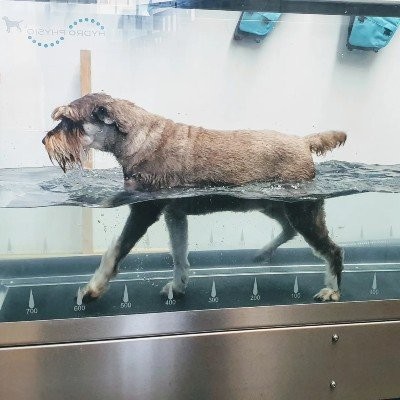Article updated May 2023.
As the trees across the Illawarra start to yellow and the afternoons get shorter, it’s obvious that winter is on it’s way. While the cooler temperatures are dealt with by most of us by adding a few more layers and firing up the heater, it’s important not to forget our furry family members. Pets such as dogs, cats and even rabbits feel the change in seasons and need to be considered as the temperatures drop.
Dogs and cats arthritis symptoms during winter
Many of our pets suffer from joint pain, especially during their older years or if they’ve suffered an injury in the past. These aches and pains can be exacerbated during the cooler months and your dog or cat can’t speak up to let you know what’s hurting. Animals are often much more resilient than humans and may be putting up with significant pain before they show obvious signs of discomfort. Pay attention to how your pet moves about, particularly with actions such as jumping up on to surfaces or managing stairs – if they appear more stiff that usual or seem to be avoiding certain movements, they could be experiencing pain in their back or joints. The good news is that your local vet can often prescribe a treatment to ease their discomfort and improve their enjoyment of life.
Hydrotherapy is a great option for managing arthritis in dogs. While swimming is a great form of exercise due to no weight bearing, cold water can exacerbate the condition, so hydrotherapy in a heated environment can provide many benefits. Port Kembla’s Water Walkies is a canine hydrotherapy and rehabilitation centre and helps many Illawarra dogs by improving their mobility and wellbeing. Sessions are run by experienced and accredited canine rehabilitation practitioners and always with a veterinarian referral.


Winter grooming for your pets
Exposure to wet grass, mud and puddles can increase the likelihood of matting and knots in longer haired breeds. Pay special attention to their underside and paws to check for grass seeds or other debris that can get embedded in matted fur and cause irritation. Dog owners in the Illawarra are fortunate enought to have a range of dog beaches and off-leash parks to enjoy. If your dog enjoys a romp around the park and a swim in the creek or ocean it’s important to get them warm and dry as soon as possible. There are a large number of dog groomers in the Illawarra and mobile dog wash services in the area who can take the hassle out of keeping your pet’s coat well maintained during winter. A visit to the dog groomer isn’t just for longer haired breeds – it’s important also to keep an eye on the length of their nails. If dog’s nails get too long, it can affect the way they walk and cause foot and joint pain, as well as increasing the chance of them getting caught on something by accident and causing an injury to the nail bed… painful AND expensive!
A warm environment.
If at all possible, allow your pets to spend the night inside. Most animals will prefer to be close to you simply for the company, but all of them will appreciate the comfort of being protected from the elements. If you can’t have your pet inside the house with you, consider access to the garage or at least a really good quality kennel that can be kept warm and dry, with soft bedding. Smaller pets such as rabbits and guinea pigs can be sensitive to temperature changes and may need to be brought indoors during extreme heat and also extreme cold.
Dr Aine Seavers from Oak Flats Vet Clinic advises cat owners to be mindful that cats prefer a warmer temperature than humans, particularly as they get older. If cats don’t have access to a constant source of heat, they can get themselves in to risky situations such as climbing up under cars or into tumble dryers in order to seek out warmth. The ideal ambient temperature for cats is over 30C, so consider a decent heat source for your feline friends in your home. Dr Seavers has written an indepth article on cats need for heat, which can be accessed here.
Winter Diet and weight gain for pets.
It’s not uncommon for dogs and cats to be less active during the colder months. This might be due to you being outdoors less or because their joints may be stiff making them want to move around less. This doesn’t necessarily mean they will need less food though, because they energy required for the body to keep warm may actually require those extra calories they’d usually be burning up when they run around more. It’s important to closely monitor your pet’s food intake and weight – obesity in dogs and cats is a common issue and can lead to all sorts of health problems such as increased joint pain and strain on their heart. Regular vet check ups can help you stay on track of your pet’s weight and you can discuss their dietary and nutritional needs to get expert advice.




